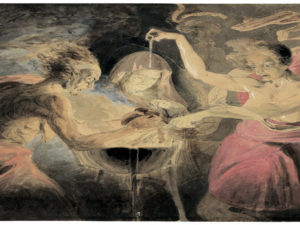
Guest post by Helen Marshall
*
Dr Helen Marshall is an acclaimed writer, editor and book historian. She is the Lecturer for Creative Writing and Publishing at Anglia Ruskin University.
As we eagerly await the end of the snows and the release of the submissions list, which will launch the first major phase of the Arthur C. Clarke jury’s deliberations, I thought it would be useful to pause for a moment and reflect upon the major threads introduced by our jury members so far. In assembling the jury, Maureen and I wanted to draw together reviewers from different backgrounds and with different ideas of what criticism might mean and what it ought to do. I’ve been delighted to see the range of approaches offered so far as well as the questions they open up. What follows then are my own impressions of some of the major threads that connect these approaches.
Our first poster, Alasdair Stuart, suggests that his form of criticism is filtered through the lens of the critical training he gained through his Masters degree but also focuses on cultural engagement. He identifies with science fiction as a literature of escape and tries to balance “undiscerning joy” and the “relentless caution of analysis.” This approach finds interesting points of intersection with that of Samira Nadkarni, which recognise the personal nature of the reading experience and argues that these experiences can create “artificial distinctions of high and low art”. Picking up on Alasdair’s interest in cultural engagement – if one form of this can be taken to mean the reader or critic’s engagement with culture, not just the writer’s – she writes:
I have little to no belief in a pure, objective, distanced reader-critic, and don’t really see an emotional and/ or crowd-sourced response as lesser in any way, shape, or form. Community has value and feelings have value. Community and feelings are part of fiction. Communities are political. The personal is political. Fiction is political.
These perspectives highlight how science fiction criticism has struggled with its own position within the hierarchy of low art versus high art. It is a point worth returning to, particularly within the context of award deliberations. Here, Alasdair’s reflection on the power of escapism, one of the labels traditionally used to dismiss science fiction, opens up a number of questions we might explore further. What exactly is the problem with escapism? What exactly is the problem with emotional and/or crowd-sourced responses? What’s the problem with the category of popular fiction? Their approaches seem to frame this community-driven response, which comes out of a deep, passionate engagement with the genre and its texts, as offering the potential for dismantling (or at least questioning) rigid frameworks of value and authority.
Gary K Wolfe and Maureen Kincaid Speller take a slightly different tack. As an academic and a professional book reviewer, Gary’s essay hints at a potential divergence between the work of the literary scholar, which at times may mean abandoning clarity in favour of disciplinary jargon and the work of the professional critic who writes for a general audience. He focuses on what a review ought to do: it ought to give a context for the work under discussion and the insights it offers ought to go beyond simple evaluation. Building on this, Maureen frames critical writing as either a poison or a remedy, depending on how you use it. She believes that the context of a novel extends outside of the genre. A review, for her, ought to dig deep and ask questions; those questions in turn can spark conversations…
One recurring question that emerged within these introductions is that of authority: who has authority, the community or the critic? Are ideas of authoritative reviewing still useful or do they need further examination? And to what extent is this connected to the evaluative function of a review? As our jury members delve deeper into the project, I suspect these questions of authority, contextualisation and evaluation will continue to arise.
Maureen’s suggestion of criticism as remedy – that is, a positive and useful activity for the reviewer, and not just for the reader – runs through the final two introductions. Foz Meadows discusses how she developed her skills through practice as a casual critic, one active on forums where she debated other writers and tested her ideas. She suggests her reviewing offered her a way to fumble toward “a better critical consciousness”, one in which she could identify her own prejudices, recognise the distinction between facts and opinions, and develop a more precise form of language.
This leads me toward Nick Hubble’s post, which acknowledge criticism as a vehicle for analysing contemporary culture (perhaps taking us back around to Alasdair’s interest in cultural engagement…) but also extends this thinking more broadly about the good criticism might do. He draws together a range of scholars including Rita Felski and Joseph North, to argue
…while there is nothing inherently wrong in seeking to discriminate between what we think of as “good” and “bad”, or “genre” and “literary” fiction, what really matters is that we are able to read across these categories and benefit from the things they tell us, which in some cases will be different things but nonetheless things that we all need to know.
Criticism then emerges both as a descriptive process but also as something more than that: a process which can help to order the thoughts of the critic (and by extension, one hopes, the reader) and, perhaps even intervene in culture. The nature of what interventions of this sort might look like, I admit, seem murky to me at the moment and even North, whom Nick points toward in his introduction, doesn’t offer a full account of what a usefully interventionist criticism might look like—but it is an area I hope we continue to explore.
As our project progresses, I expect our jurors will continue to explore and debate many of these questions and I invite our readers to raise other questions in the Comments section. But in drawing some of these threads together, I wonder if we might see science fiction as a literature of escape (from mundane life, from a system of external cultural, racial and national hierarchies, from the neoliberal order of the west…), but crucially science fiction criticism as one of the means of escape.
2 Comments
-
I’m sure I’m not alone in relishing the way in which the introductory posts from this year’s shadow jurors have placed an emphasis on interrogating the practice of criticism itself. Not simply ‘what is the point of criticism’ but also ‘what does criticism mean to me personally’? Literary criticism is an art, just as the writing of fiction is an art, and for the critic to excel it is surely necessary for them to have an understanding of their purpose, limitations, and what gets their goat. Foz’s words on objectivity in particular resonated with me:
“At base, my approach to criticism is that total objectivity is impossible. Everyone has a bias, which is another way of saying that everyone has their own tastes, opinions, and context, and that rather than trying to feign objectivity by generalising those biases into an inherently limited concept of what is Normal or Traditional and therefore Good, the more honest, productive approach is to acknowledge them openly. In this way, I believe, our literary yardsticks become both more varied in terms of scope and more individually useful to the audience. ”
Certainly my own key area of growth as a critic last year lay in coming to a fuller understanding of this. Relinquishing the idea of objectivity in criticism is actually very freeing, leaving you with the realisation that as an intellectual and artistic activity literary criticism is even more radical, dynamic and individually creative than you thought it was. I’m looking forward very much to hearing more from this year’s Sharkes as the project progresses, and (hopefully) reading right along with them!
Pingbacks
-
[…] (9) SHARKE WATCH. Shadow Clarke jury convenor Dr. Helen Marshall provides “A Means of Escape: A Round-Up of Our Posts So Far”. […]



